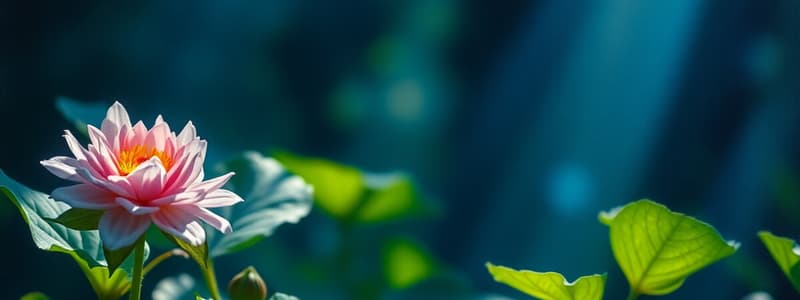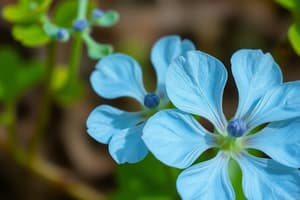Podcast
Questions and Answers
What color is Bromothymol Blue (BTB) when carbon dioxide is present?
What color is Bromothymol Blue (BTB) when carbon dioxide is present?
- Blue
- Green (correct)
- Purple
- Yellow (correct)
What are the overall products of photosynthesis?
What are the overall products of photosynthesis?
Oxygen and glucose
Which of the following are products of the light-dependent reactions of photosynthesis?
Which of the following are products of the light-dependent reactions of photosynthesis?
- Carbon Dioxide
- Oxygen (correct)
- Water
- NADPH (correct)
- ATP (correct)
- Sunlight
Which of the following are reactants of the light-independent reactions of photosynthesis?
Which of the following are reactants of the light-independent reactions of photosynthesis?
What is the chemical equation for photosynthesis?
What is the chemical equation for photosynthesis?
Which of these is NOT part of the structure of a chloroplast?
Which of these is NOT part of the structure of a chloroplast?
Photosystem II comes before photosystem I in the electron transport chain.
Photosystem II comes before photosystem I in the electron transport chain.
What is the role of ATP synthase in photosynthesis?
What is the role of ATP synthase in photosynthesis?
How do the plant structures: cuticle, upper and lower epidermis, veins, stomata, and guard cells, contribute to the plant's ability to survive?
How do the plant structures: cuticle, upper and lower epidermis, veins, stomata, and guard cells, contribute to the plant's ability to survive?
What is the primary function of a calorimeter?
What is the primary function of a calorimeter?
How is burning food analogous to the way our bodies extract energy from food?
How is burning food analogous to the way our bodies extract energy from food?
A calorie is the amount of energy required to raise the temperature of 1 gram of water by 1 degree Celsius.
A calorie is the amount of energy required to raise the temperature of 1 gram of water by 1 degree Celsius.
How does measuring the change in water temperature relate to the caloric content of food?
How does measuring the change in water temperature relate to the caloric content of food?
Which of the following is NOT a product of cellular respiration?
Which of the following is NOT a product of cellular respiration?
Glycolysis takes place in the mitochondria.
Glycolysis takes place in the mitochondria.
Which of the following molecules is a product of the Krebs Cycle?
Which of the following molecules is a product of the Krebs Cycle?
What is the role of the electron transport chain in cellular respiration?
What is the role of the electron transport chain in cellular respiration?
Fermentation occurs in the presence of oxygen.
Fermentation occurs in the presence of oxygen.
What are the two main types of fermentation?
What are the two main types of fermentation?
Fermentation is a more efficient process than cellular respiration.
Fermentation is a more efficient process than cellular respiration.
What food products are produced by lactic acid fermentation?
What food products are produced by lactic acid fermentation?
Photosynthesis and cellular respiration are reverse reactions of each other.
Photosynthesis and cellular respiration are reverse reactions of each other.
Flashcards
Bromothymol Blue (BTB) indicator
Bromothymol Blue (BTB) indicator
A chemical indicator that changes color based on the presence of carbon dioxide. Blue in the absence of CO2, green with some CO2, and yellow with a lot of CO2.
Photosynthesis reactants
Photosynthesis reactants
Sunlight, carbon dioxide, and water are needed for photosynthesis.
Photosynthesis products
Photosynthesis products
Oxygen and glucose are produced during photosynthesis. Glucose acts as food for plants.
Light-dependent reaction reactants
Light-dependent reaction reactants
Signup and view all the flashcards
Light-dependent reaction products
Light-dependent reaction products
Signup and view all the flashcards
Light-independent reaction reactants
Light-independent reaction reactants
Signup and view all the flashcards
Light-independent reaction products
Light-independent reaction products
Signup and view all the flashcards
Photosynthesis equation
Photosynthesis equation
Signup and view all the flashcards
Chloroplast structure
Chloroplast structure
Signup and view all the flashcards
Photosystem II
Photosystem II
Signup and view all the flashcards
Photosystem I
Photosystem I
Signup and view all the flashcards
Electron transport chain
Electron transport chain
Signup and view all the flashcards
ATP synthase
ATP synthase
Signup and view all the flashcards
Calorimeter
Calorimeter
Signup and view all the flashcards
Cellular Respiration Reactants
Cellular Respiration Reactants
Signup and view all the flashcards
Cellular Respiration Products
Cellular Respiration Products
Signup and view all the flashcards
Glycolysis location
Glycolysis location
Signup and view all the flashcards
Krebs Cycle location
Krebs Cycle location
Signup and view all the flashcards
Electron Transport Chain location
Electron Transport Chain location
Signup and view all the flashcards
ATP Synthase function
ATP Synthase function
Signup and view all the flashcards
Cellular Respiration Advantages
Cellular Respiration Advantages
Signup and view all the flashcards
Fermentation Advantages
Fermentation Advantages
Signup and view all the flashcards
Fermentation Disadvantages
Fermentation Disadvantages
Signup and view all the flashcards
Plant structure adaptation
Plant structure adaptation
Signup and view all the flashcards
Study Notes
Bromothymol Blue (BTB)
- BTB is a chemical indicator for carbon dioxide
- Blue color indicates no CO2
- Green color indicates some CO2
- Yellow color indicates a lot of CO2
Photosynthesis
- Overall Reaction: Sunlight + CO2 + H2O → O2 + Glucose
- Light-Dependent Reactions: Sunlight, ADP, NADP+, H2O → NADPH, ATP, O2
- Light-Independent Reactions: NADPH, ATP, CO2 → NADP+, ADP, Glucose
- Chloroplast Structure: Outer and inner membranes, thylakoid membranes, grana (stacks of thylakoids), stroma (space between grana)
- Photosystem II: Absorbs sunlight, generates high-energy electrons
- Photosystem I: Reactivates electrons from Photosystem II
- Electron Transport Chain: Electrons move from Photosystem II to Photosystem I, releasing energy to pump hydrogen ions into inner thylakoid space.
- ATP Synthase: Converts hydrogen ions into ATP.
Plant Structure
- Chloroplast arrangement: Spread out to maximize sunlight exposure
- Cuticle and epidermis: Protect plant cells
- Veins: Transport sugars
- Stomata: Primary transport of CO2, O2, water vapor
- Guard Cells: Regulate gas/molecule exchange (stomata opening and closing)
Calorie Lab
- Calorimeter: Measures heat exchange, minimizes energy loss
- Burning food: Breaks chemical bonds, releases energy
- Calories and water temperature: One calorie raises one gram of water by one degree Celsius.
Cellular Respiration
- Overall Reaction: Glucose + O2 → CO2 + H2O + ATP
- Glycolysis: Occurs in the cytoplasm, Glucose → 2 pyruvic acid, 2 ATP, NAD+ → NADH, ADP (?)
- Krebs Cycle: Occurs in mitochondria, Pyruvic acid → ATP, CO2, NADH, FADH2
- Electron Transport Chain: Occurs in inner mitochondrial membrane, NADH, FADH2, O2 → ATP, H2O, FAD, NAD+
- ATP Synthase: Converts hydrogen ions into ATP, ADP → ATP.
- Advantages over fermentation: Higher ATP yield, neutral byproducts
- Disadvantages of cellular respiration: Requires oxygen, slower process
Fermentation
- Occurs: Absence of oxygen
- Purpose: Allows glycolysis to continue
- Advantages: Continues energy production without oxygen
- Disadvantages: Lower ATP yield, byproducts
Connecting Cycles
- Photosynthesis and cellular respiration are opposite processes
- Plants and animals both do cellular respiration
- Plants do photosynthesis
- Reactions occur in reverse order
Additional Information
- Products of alcoholic fermentation: Ethyl alcohol, carbon dioxide
- Lactic acid fermentation: Produces lactic acid, common in muscle cells
- Uses of fermentation by microbes: Cheese, yogurt, buttermilk, sour cream, pickles, sauerkraut, kimchi, sourdough
Studying That Suits You
Use AI to generate personalized quizzes and flashcards to suit your learning preferences.




